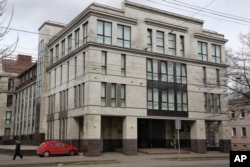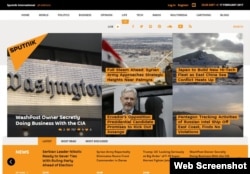Emails accusing German soldiers stationed in Lithuania of rape were sent this week to local news outlets, the latest incident in what NATO officials say is a Russian "fake news" campaign aimed at eroding public support for the military alliance.
The emails, which were sent to several Lithuanian media outlets on February 14, claimed German soldiers based in the Baltic state had raped an underage Lithuanian girl.
Some Lithuanian outlets reported the claim, which was dismissed by Lithuanian police, who are trying to track the internet protocol address involved in the distribution of the allegation.
"To our knowledge, Lithuanian police investigations came to the conclusion that there were neither a victim nor possible witnesses nor any perpetrators," said a spokesman for the German Ministry of Defense.
The misinformation incident bears similarity to the so-called Lisa case last year in which Russian media outlets first reported and then fomented a media storm in Germany about a claim made by 13-year-old Russian-German girl who said she'd been abducted and raped by Arab migrants in Berlin.
It transpired that the girl had made up the story, hoping to disguise from her parents that she'd spent the night at a boyfriend's home. The Lisa case affected already strained relations between Berlin and Moscow.
NATO officials say that Germany's leading role in the Ukraine crisis and support of sanctions has made the country a key target of Russian disinformation. German troops deployed in Lithuania this month, and they are part of an increased NATO presence in the Baltic states and Poland — a response by the Western alliance to Russia's annexation of Crimea and Moscow's support for pro-Russian separatists in the Donbas region of eastern Ukraine.
Effort to sow discord seen
The past year has seen a series of fake news and misinformation incidents that NATO officials maintain are conceived in Moscow and conducted as part of an active-measures campaign seeking to shape Western public opinion and sow political discord in the U.S. and European countries.
In December, the head of Britain's espionage service, Alex Younger, in his first major public speech as "C," the designation given the head of the Secret Intelligence Service, accused Russia of waging a hybrid war. He warned that Britain and Western nations were facing grave threats to their security and political systems from hostile propaganda and cyberattacks by rival states.
In October, U.S. intelligence chiefs accused the Kremlin of being behind the hacking of the Democratic National Committee's computer system and of the emails of Hillary Clinton's staff during last year's presidential campaign. The computer intrusions were directed by some of "Russia's senior-most officials" in an unprecedented effort to influence the elections, the chiefs alleged.
In July, a senior European Commission official said that Russian propaganda had deeply penetrated all EU member states, helped by local politicians eager to exploit the confusion sown for their own purposes. Speaking in Brussels, Jakub Kalenski, a member of the European External Action Service task force assigned to study Russian propaganda, said Russian-sourced disinformation could be seen across Europe.
Methods vary
EU officials say the Kremlin is using different tactics and methods, depending on the countries being targeted. In the Baltic countries, the target is generally the Russian-speaking population, via Russian television channels. In Central European states such as Poland, Hungary and the Czech Republic, however, the subversion is more disguised, with hundreds of disinformation websites being used. In Scandinavia, propaganda is being put out on social media by state-sponsored internet trolls posting inflammatory comments.
The Western military alliance's online magazine, the NATO Review, outlined recently what it saw as the progression and coordination of Russian-inspired disinformation involving Russian media, populist parties on right and left determined to break up the political status quo, and the use of a network of friendly former politicians and sympathetic think tanks to spread the false news and influence political debate.
After the Lithuania allegation broke, NATO Secretary General Jens Stoltenberg told reporters in Brussels that there had been several previous attempts to spread disinformation about NATO.
Last month, Sweden's most authoritative foreign policy think tank, the Swedish Institute of International Affairs, issued a study accusing Russia of using underhand methods, including fake news, counterfeit documents and other disinformation, to try to influence Swedish decision-making. The campaign was focused, it said, on steering the country away from joining NATO.
The study said an array of active measures were being used, including broadcasting misleading reports on Russia's state-run news website Sputnik that were then picked up in Sweden. At other times, forged documents and fabricated news items consistent with Russia's strategic objectives have first appeared in obscure Swedish media outlets, which were picked up subsequently by Sputnik and "other sources of Russian public diplomacy" and broadcast to an international audience.
Twitter trolls
According to the report, Russia's active measures are aimed at hampering the Swedish government's ability to generate public support in pursuing policies. Measures have included the Russian government deploying trolls on Swedish Twitter and launching its own Swedish-language version of the news site Sputnik.
The study identified 26 forgeries that surfaced in the Swedish media between the end of 2014 and mid-2016. Most first appeared on "obscure Russian- and/or Swedish-language websites."
One forged document purported to show a conspiracy involving Sweden and NATO to send weapons to the Islamic State terror group via Turkey. Another fake letter purportedly concerned an attempt to quash prosecution of a Swede for war crimes committed in Ukraine.
On Monday, aides of French politician Emmanuel Macron said he had become a fake-news target of Russian media and that his presidential campaign had been facing thousands of cyberattacks. Richard Ferrand, secretary-general of Macron's En Marche! (Onwards!) party, said Russian state-controlled media Russia Today and Sputnik had spread false reports with the aim of swinging public opinion against him.







